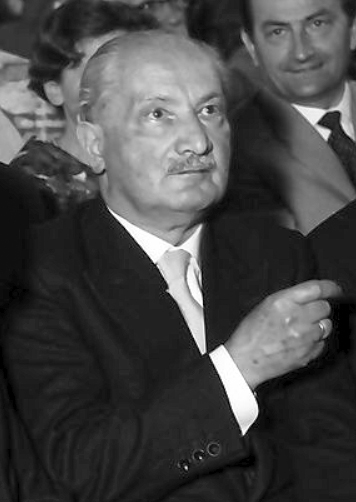More languages
More actions
No edit summary Tag: Visual edit |
mNo edit summary Tag: Visual edit |
||
| Line 1: | Line 1: | ||
{{Infobox philosopher|name=Martin Heidegger|nationality=German|birth_date=26 September 1889|birth_place=[[Meßkirch]], [[Grand Duchy of Baden (1806–1918)|Grand Duchy of Baden]], [[German Empire (1871–1918)|German Empire]]|death_date=26 May 1976 (aged 86)|death_place=Meßkirch, [[State of Baden-Württemberg|Baden-Württemberg]], [[West Germany]]|image=Martin Heidegger.png|image_size=200|school_tradition=[[Existentialism]]<br>[[Postmodernism]]}} | {{Infobox philosopher|name=Martin Heidegger|nationality=German|birth_date=26 September 1889|birth_place=[[Meßkirch]], [[Grand Duchy of Baden (1806–1918)|Grand Duchy of Baden]], [[German Empire (1871–1918)|German Empire]]|death_date=26 May 1976 (aged 86)|death_place=Meßkirch, [[State of Baden-Württemberg|Baden-Württemberg]], [[West Germany]]|image=Martin Heidegger.png|image_size=200|school_tradition=[[Existentialism]]<br>[[Postmodernism]]}} | ||
'''Martin Heidegger''' (26 September 1889 – 26 May 1976) was a [[National Socialist German Workers' Party|Nazi]] philosopher and postmodernist. He criticized the [[rationalism]] of Western philosophy and claimed that technology removes the intrinsic [[value]] of people and objects. He inspired anti-[[Marxism|Marxist]] [[Liberalism|liberal]] [[French Republic|French]] intellectuals during the 1960s and 1970s. More recently, | '''Martin Heidegger''' (26 September 1889 – 26 May 1976) was a [[National Socialist German Workers' Party|Nazi]] philosopher and postmodernist. He criticized the [[rationalism]] of Western philosophy and claimed that technology removes the intrinsic [[value]] of people and objects. He inspired anti-[[Marxism|Marxist]] [[Liberalism|liberal]] [[French Republic|French]] intellectuals during the 1960s and 1970s. More recently, [[Fascism|fascists]] such as [[Aleksandr Dugin]] and [[Richard Spencer]] have promoted his works.<ref name=":0">{{Web citation|author=Matthew Sharpe|newspaper=The Conversation|title=Heidegger in ruins? Grappling with an anti-semitic philosopher and his troubling rebirth today|date=2023-04-11|url=https://theconversation.com/heidegger-in-ruins-grappling-with-an-anti-semitic-philosopher-and-his-troubling-rebirth-today-200826|archive-url=https://web.archive.org/web/20230412200401/https://theconversation.com/heidegger-in-ruins-grappling-with-an-anti-semitic-philosopher-and-his-troubling-rebirth-today-200826|archive-date=2023-04-12|retrieved=2023-04-18}}</ref> | ||
== Nazi beliefs == | == Nazi beliefs == | ||
| Line 9: | Line 9: | ||
[[Category:Philosophers]] | [[Category:Philosophers]] | ||
[[Category:Fascists]] | [[Category:Fascists]] | ||
<references /> | |||
{{DEFAULTSORT:Heidegger, Martin}} | |||
Revision as of 18:27, 7 May 2023
Martin Heidegger | |
|---|---|
 | |
| Born | 26 September 1889 Meßkirch, Grand Duchy of Baden, German Empire |
| Died | 26 May 1976 (aged 86) Meßkirch, Baden-Württemberg, West Germany |
| School tradition | Existentialism Postmodernism |
| Nationality | German |
Martin Heidegger (26 September 1889 – 26 May 1976) was a Nazi philosopher and postmodernist. He criticized the rationalism of Western philosophy and claimed that technology removes the intrinsic value of people and objects. He inspired anti-Marxist liberal French intellectuals during the 1960s and 1970s. More recently, fascists such as Aleksandr Dugin and Richard Spencer have promoted his works.[1]
Nazi beliefs
Heidegger joined the Nazi Party on 1 May 1933 and made a series of speeches in support of the Third Reich. He claimed that Jews were predisposed to criminality and that they somehow controlled the world. He also said that Allied war crimes during the Second World War were a thousand times worse than those of the Nazis. His works were banned in Germany until the 1980s.[1]
References
- ↑ 1.0 1.1 Matthew Sharpe (2023-04-11). "Heidegger in ruins? Grappling with an anti-semitic philosopher and his troubling rebirth today" The Conversation. Archived from the original on 2023-04-12. Retrieved 2023-04-18.
